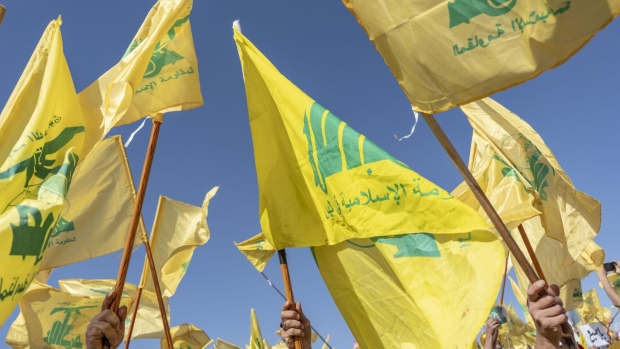Feb 7, 2024
US Kills Commander of Iran-Backed Militiant Group in Iraq Strike
, Bloomberg News

(Bloomberg) -- The US killed the commander of an Iran-backed militia with a drone strike in Baghdad on Wednesday night, as the White House targets groups responsible for a deadly attack on an American base last month.
The leader belonged to Kataib Hezbollah and was “responsible for directly planning and participating in attacks on US forces in the region,” the Pentagon said, without naming them. “The United States will continue to take necessary action to protect our people.”
It said there appeared to be no collateral damage and no civilian casualties from the strike.
Kataib Hezbollah identified the target as Abu Baqer Al-Saaedi. The Iraqi government criticized the strike and said it would strengthen Baghdad’s resolve to get US forces to leave the country.
“Set your clocks for revenge time,” Kataib Hezbollah said on Telegram on Thursday.
The Shiite paramilitary group claimed a drone attack in Jordan in January that killed three American soldiers and wounded dozens.
They were the first US troops killed in an attack since the Israel-Hamas war erupted on Oct. 7, roiling the wider Middle East. US bases in Syria and Iraq have been assaulted more than 100 times since then by Iran-backed groups using missiles and drones, causing the to US to respond with its own strikes against the militants.
Kataib Hezbollah, which roughly translates from Arabic as Brigades of God, had said it was suspending operations against the US in the aftermath of the Jordan deaths. Some analysts said that was a signal Iran had pressured them to avoid escalating tensions with Washington even further.
The commander was travelling in a car when he was hit and was the sole target, though there may have been other people in the vehicle, according to a US official, who asked not to be identified discussing sensitive information.
The US launched heavy strikes on Iranian-linked targets in Iraq and Syria late last week as part of its response to the Jordan base attack. American officials described those as the start of a more aggressive campaign against militants that Tehran provides money and training to.
The violence underscores the high risk of the fallout from the Israel-Hamas war worsening, even as the US says it’s trying to prevent that very outcome.
For now, global markets are more or less confident the US can contain the tensions and avoid a direct confrontation with Iran. Brent crude is up 4% this year, but remains only slightly above $80 a barrel. No oil or natural gas production in the Middle East has yet been impacted.
Houthi Attacks
The US has also targeted Iran-backed Houthi militants in a bid to stop their attacks on ships around the southern Red Sea. While the Houthis, based in Yemen, are still assaulting vessels with drones and missiles, the US says its strikes have weakened the group’s firepower.
So far, President Joe Biden has declined to conduct attacks on Iranian territory, something the US hasn’t done for decades. He’s faced some pressure from Republicans to do that, including from Senator Lindsey Graham, who’s long advocated a tougher stance on Iran.
The US airstrikes in Syria and Iraq last week targeted elements of Iran’s Quds Force. That’s part of the Islamic Revolutionary Guard Corps and responsible for handling many of Tehran’s relations with proxy groups.
Earlier: US Vows More Mideast Strikes While Trying to Avert Wider War
Iran backs anti-Israel and anti-US groups across the region. Together, they are often called the “axis of resistance.” They include Hamas in Gaza and Hezbollah in Lebanon, as well as the Houthis and militias in Syria and Iraq.
The Iraqi government said civilians were among at least 16 people killed when the US struck last week. That incensed Baghdad, which accused Washington of putting the region “on the brink of an abyss.”
The US has about 2,000 troops in Iraq, 900 in Syria and 3,000 in Jordan.
In 2020, under then-President Donald Trump, the US assassinated Iranian general Qassem Soleimani in Iraq, saying he was responsible for planning attacks on Americans through the proxies. Iran responded by striking US bases in Iraq, injuring many troops but not killing any.
Wednesday’s strike will probably be viewed as less incendiary by Iran because the commander wasn’t Iranian. It tends to react less aggressively to killings of members of its proxy groups.
--With assistance from Patrick Sykes, Omar Tamo and Kateryna Kadabashy.
(Updates with Iraqi government’s response.)
©2024 Bloomberg L.P.








